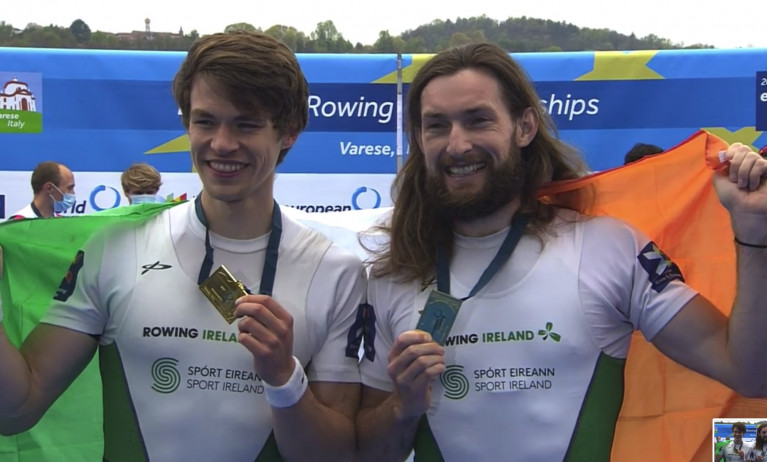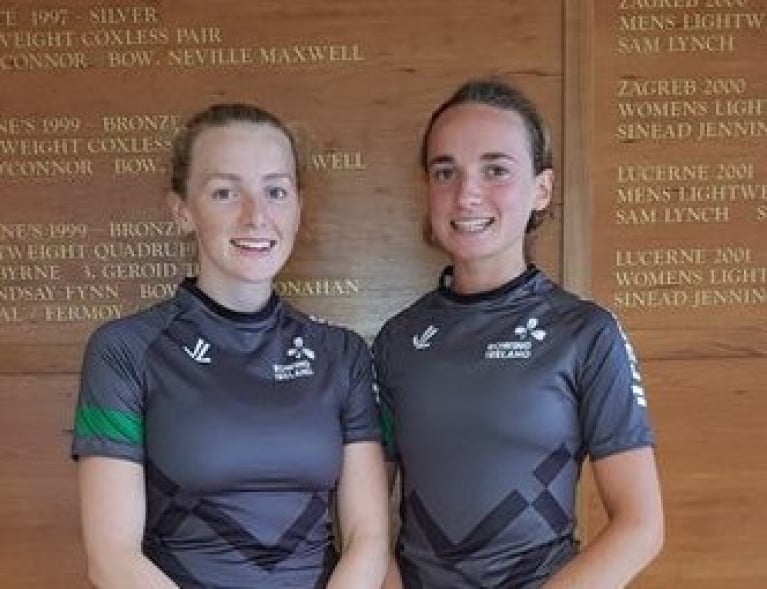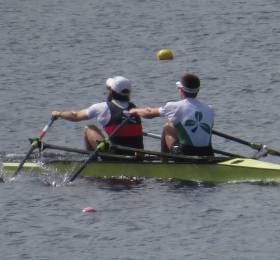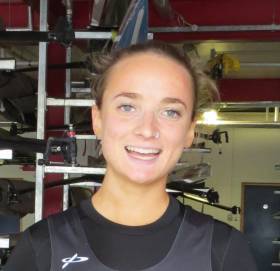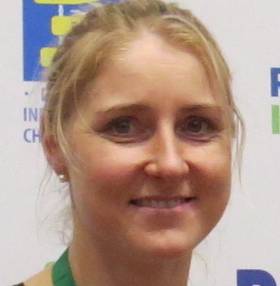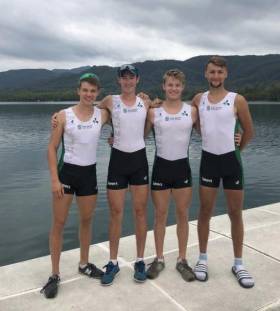Displaying items by tag: McCarthy
Gold for O'Donovan and McCarthy at European Rowing Championships
Paul O’Donovan and Fintan McCarthy won gold for Ireland at the European Rowing Championships today in Italy, adding to an excellent silver for the women’s four earlier.
The Ireland lightweight double saw off a spirited display by Germany, who led early on. Ireland moved decisively through the middle stages and took over the lead at 1300 metres. They then sprinted through the final few hundred metres to win by a length from Germany, with Italy third.
“It was a decent race, it’s good to be back,” O’Donovan said. “I was off last season so Fintan raced in the single last year. Fintan is just dragging me along in the double. We need bigger biceps. We’re gonna work on some curls which will see us through to the end of the summer.”
The Ireland women’s four looked impressive as they took silver in Varese.
The crew of Aifric Keogh, Eimear Lambe, Fiona Murtagh and Emily Hegarty raced so well that they pushed up very close to the Netherlands in a push for gold.
The new Irish combination started slowly, but slotted into the leading trio of the Dutch, British and Irish. In the third quarter the Ireland four pushed through Britain and then tested the Dutch coming to the line.
Britain, with Rebecca Shorten of Northern Ireland in the stroke seat, took bronze.
Keogh said: “The medal this year means a lot to us because were so close to Olympic qualification. A lot of crews from Ireland are already qualified, and for us to be able to finish that close to the Dutch is a really huge confidence boost.”
Earlier, the women’s pair of Aileen Crowley and Monika Dukarska showed well in the early stages of their A Final, but in a hot race they were pushed back to sixth at the finish. Britain’s Helen Glover and Polly Swann justified their favouritism to race to gold – but they were given a battle by Romania, while Spain took the bronze.
The racy lightweight double scull of Aoife Casey and Margaret Cremen gave a good performance in a superb final. Italy were the surprise winners from Britain and the Netherlands, with Ireland taking fifth.
Gary O’Donovan had to settle for fourth in his A Final of the lightweight single sculls. The race belonged to Peter Galambos of Hungary: he led through all four quarters. O’Donovan made ground in the closing stages, but was 4.3 seconds off Galambos at the finish.
Lydia Heaphy got off to a great start in the lightweight women’s single and led early on. However, Alena Furman of Belarus moved swiftly into the lead and stretched it down much of the course to win gold. Heaphy finished sixth.
Enniskillen woman Holly Nixon teamed up in the Britain double with Saskia Budgett to take a bronze medal in a race won by Romania.
European Rowing Championships, Varese, Italy, Day Three (Irish interest)
Men
Double Sculls – B Final (Places 7 to 12): 1 Ireland (R Byrne, P Doyle) 6:21.47, 2 Italy 6:22.52, 3 Germany 6:23.29.
Single Sculls – C Final (Places 13 to 18): 1 Russia 7:08.08, 2 Ireland (D Lynch) 7:09.01.
Lightweight Double – A Final: 1 Ireland (F McCarthy, P O’Donovan) 6:18.14, 2 Germany 6:19.94, 3 Italy 6:21.05.
Lightweight Single Sculls – A Final: 1 Hungary (P Galambos) 7:01.52; 4 Ireland (G O’Donovan) 7:05.82.
Women
Four – A Final: 1 Netherlands 6:27.51, 2 Ireland (A Keogh, E Lambe, F Murtagh, E Hegarty) 6:27.96, 3 Britain (4 R Shorten) 6:31.27.
Pair – A Final: 1 Britain 7:02.73; 6 Ireland (A Crowley, M Dukarska) 7:11.83.
Double Sculls – A Final: 3 Britain (1 H Nixon) 6:55.13.
Lightweight Double – A Final: 1 Italy 6:58.66, 2 Britain 6:59.56, 3 The Netherlands 7:01.13; 5 Ireland (A Casey, M Cremen) 7:07.42.
Lightweight Single Sculls – A Final: 1 Belarus (A Furman) 7:41.81; 6 Ireland (L Heaphy) 7:58.70.
Two superb performances by lightweight doubles got Ireland off to an excellent start on day two of the European Rowing Championships in Varese today.
The men’s crew of Paul O’Donovan and Fintan McCarthy would go on to have a great win in their semi-final, but Aoife Casey and Margaret Cremen deserve the plaudits for taking second in their semi-final.
This crew is aimed at the Olympic Qualification regatta next month in Lucerne and looked to be an outside bet initially. Their performances at this regatta changed that.
In today’s semi, they showed great maturity. Italy took over early and were never headed, while Russia and Ireland tracked them in second and third. But the final quarter Ireland pushed through into a firm second place.
Cremen and Casey take their place in the A Final on Sunday. The other semi-final, won by Britain from the Netherlands, looked stronger, but Ireland even have an outside chance of a medal.
McCarthy and O’Donovan were favourites for gold right from the start. Doubts, if there were some, related to the ability of the 2019 World Champions to turn it on again after effectively missing the 2020 season, such as it was.
They had a real test in Italy, who led early and might have expected another battle in the closing stages. It never happened. Coming up to halfway, McCarthy and O’Donovan zoomed past the men in blue. They opened up the lead to clearwater and won.
Germany, who won the other semi-final, will contend on Sunday. However, their winning time was slower than the Irish today.
The Ireland double of Philip Doyle and Ronan Byrne were well off the pace in their semi-final and finished sixth. France, Britain and Switzerland got off to good starts and duly took the A Final places. Ireland had a poor start. They tried to move into contention in the middle stages but could not get a hold on the contest.
Daire Lynch qualified for the C Final (places 13 to 18) of the men’s single sculls, taking second in his semi-final.
European Rowing Championships, Varese, Italy – Day Two (Irish interest)
Men
Double Sculls – A/B Semi-Final (First Three to A Final; rest to B Final): 1 France 6:10.26, 2 Britain 6:11.17, 3 Switzerland 6:12.79; 6 Ireland (P Doyle, R Byrne) 6:21.38.
Lightweight Double Sculls – A/B Semi-Final (First Three to A Final; rest to B Final): 1 Ireland (F McCarthy, P O’Donovan) 6:22.74, 2 Italy 6:25.53, 3 Czech Republic 6:27.14.
Single Sculls – C/D Semi-Final Two (First Three to C Final; rest to D Final): 2 Ireland (D Lynch) 7:02.22.
Women
Lightweight Double Sculls – A/B Semi-Final (First Three to A Final; rest to B Final): 1 Italy 7:11.44, 2 Ireland (A Casey, M Cremen) 7:14.44, 3 Russia 7:15.46.
Ireland Crews Weather Storm and Stay on Course
#Rowing: Paul O'Donovan and Fintan McCarthy hit the right mark in their first competitive race as the new Ireland lightweight double. At the World Cup Regatta in Rotterdam, they finished .39 seconds ahead of Australia in their time trial and qualified directly for the semi-finals.
The heats were run on a time trial basis as the regatta was buffeted by a storm and racing had to be delayed and the programme altered.
All six Ireland crews made it straight through in the changed system. The Ireland men's double of Philip Doyle and Ronan Byrne posted the best time in their heat, just ahead of Switzerland, who also qualified.
Aileen Crowley and Monika Dukarska also made it straight through. The Ireland pair finished second in their time trial to the outstanding New Zealand crew of Kerri Gowler and Grace Prendergast.
Jake McCarthy and Gary O'Donovan both qualified from their heats of the lightweight single sculls. McCarthy took second and O'Donovan third.
The one Irish crew which fell outside automatic qualification was the lightweight women's double of Lydia Heaphy and Denise Walsh. They finished fourth, but made it through as one of the fastest losers.
Cremen and Fintan McCarthy Win at Skibbereen Regatta
#Rowing: Skibbereen had a one-two-three in the men's single sculls at their own regatta at the National Rowing Centre today. Gary O'Donovan, who was returning to racing after a hand injury, won his heat, but finished second to Fintan McCarthy in the final, with Aodhan Burns third. Paul O'Donovan was absent because of exam pressures.
UCC's Margaret Cremen won the women's single, while Holly Davis of Lee Valley, a junior 14 competitor, finished an excellent third. Sanita Puspure, whose boat had not made it back from the training camp in Italy, missed the event.
A tricky wind made conditions difficult, although this improved as the day went on.
The pairs titles were claimed by proven internationals: Mark O'Donovan and Shane O'Driscoll and Aifric Keogh and Monika Dukarska.
Brian Colsh of Sligo and Shauna Murtagh of Carrick-on-Shannon came out on top in the junior 18 single sculls at Portadown. The junior 16 eights titles, boys' and girls', went to Enniskillen RGS.
Gold for Puspure and Bronze for Ireland Doubles in Italy
#Rowing: Sanita Puspure and two Ireland men’s crews took medals on the first day of the Memorial Paolo d’Aloja in Italy today. Puspure is world champion in the single sculls and she continued her run with a good win.
The men’s double of Ronan Byrne and Philip Doyle were another success story from the World Championships in 2018 – they finished ninth. They took third place in their A Final, which was won by Romania.
The bronze medal for Jake and Fintan McCarthy came in a lightweight doubles final won by Italy, with Belgium second – these crews took silver and bronze at last year’s World Championships.
The Ireland pairs of Aifric Keogh and Monika Dukarska and Aileen Crowley and Emily Hegarty took fifth and seventh in their final.
Lough Rinn Grand League Regatta, scheduled for tomorrow (Sunday), has been cancelled. The organisers had hoped to hold the event, and told clubs that some racing would not go ahead. But after receiving a forecast from Met Éireann of a powerful, gusting wind, they changed their decision.
Memorial Paolo d’Aloja, Piediluco, Italy, Saturday Finals (Irish results; selected)
Men
Double – A Final: 3 P Doyle, R Byrne 6:33.90.
Lightweight Double Sculls – A Final: 3 F McCarthy, J McCarthy 6:38.43.
Women
Pair – A Final: 5 A Keogh, M Dukarska 7:33.3; 7 A Crowley, E Hegarty 7:42.36. B Final: 3 C Feerick, E Lambe 7:45.41.
Lightweight Double – A Final: 6 C Nolan, L Heaphy 7:48.91.
Single – A Final: 1 S Puspure 7:58.89.
Ireland Lightweight Quadruple Take Third in Heat at World Rowing
#Rowing: Ireland finished third in their heat of the lightweight quadruple sculls this morning at the World Rowing Championships in Plovdiv, Bulgaria. Italy took the one direct qualification place for the Final. The men in blue harnessed the good conditions and built a lead through the race. They had a clearwater advantage by the final quarter. In a battle for second place, the Czech Republic pipped the Ireland crew of Fintan McCarthy, Ryan Ballantine, Jake McCarthy and Andrew Goff.
World Rowing Championships, Plovdiv, Bulgaria, Day Two (Irish interest)
Men
Lightweight Quadruple Sculls – Heat Two (First to A Final; rest to Repechage): 1 Italy 5:48.03; 3 Ireland (F McCarthy, R Ballantine, J McCarthy, A Goff) 5:53.43.
New Crew Added to Ireland Team for World Rowing Championships
#Rowing: A lightweight quadruple has been added to the Ireland team for the senior World Championships. Andrew Goff, Ryan Ballantine, Jake McCarthy and Fintan McCarthy will compete alongside the four women’s crews and three men’s crews named earlier this week.
Ireland Team for World Rowing Championships, Plovdiv, Bulgaria, September 9th to 16th:
Men
Pair: M O’Donovan, S O’Driscoll
Lightweight Quadruple: Andrew Goff, Ryan Ballantine, Fintan McCarthy, Jake McCarthy
Double Sculls: Ronan Byrne, Philip Doyle
Lightweight Double Sculls: Gary O’Donovan, Paul O’Donovan
Women
Pair: Aifric Keogh, Emily Hegarty
Double Sculls: Monika Dukarska, Aileen Crowley
Lightweight Double Sculls: Aoife Casey, Denise Walsh
Single Sculls: Sanita Puspure
O'Donovans Tested by Skibbereen Twins at Cork Regatta
#Rowing: Paul O’Donovan and Gary O’Donovan were tested in the men’s double sculls by Jake and Fintan McCarthy at Cork Regatta today. The two Skibbereen crews fought it out down the course with the twins not letting the O’Donovan brothers build a clear-water lead. At the end the McCarthy’s pushed, and there was less than a length in it.
UCD’s four were impressive winners. The crew of Shane O’Connell, Andrew Goff, Shane Mulvaney and David O’Malley left Commercial behind.
The Skibbereen/Lee combination of Denise Walsh and Margaret Cremen were also in charge in the women’s double. Behind them the junior double from Workmen’s won a battle for second.
Cork Regatta, Day Two (Selected Results)
Men
Four – Div One: 1 UCD (S O’Connell, A Goff, S Mulvaney, D O’Malley; sen) 6:33.45, 2 Commercial (sen) 6:38.28, 3 Shandon (sen) 6:46.05. Four, coxed – Div Two: 1 UCC (club two) 7:00.73; 6 St Joseph’s 7:19.29. C Final: 3 St Michael’s (jun 16) 7:40.34.
Sculling, Double – Div One: 1 Skibbereen A (G O’Donovan, P O’Donovan; sen) 6:46.14, 2 Skibbereen B (sen) 6:47.68; 4 Queen’s (inter) 7:15.57. B Final: Castleconnell (jun 18A) 7:19.86. C Final: 5 Belfast RC (club one) 7:57.44.
Single – Div Two: 1 Kenmare (T Kelly; jun 16) 8:01.71, 2 New Ross (jun 18B) 8:03.67, 3 Workmen’s (club two) 8:04.995.
Women
Sculling, Double – Div One: 1 Skibbereen, Lee (M Cremen, D Walsh; sen) 7:42.97, 2 Workmen’s (jun 18A) 7:56.34, 3 Fermoy (inter) 7:57.45. B Final: 4 Fermoy Castleconnell (club one) 8:17.57.
McCarthy Twins Win Heat at World Under-23 Rowing
#Rowing: Jake and Fintan McCarthy won their heat of the lightweight double sculls at the World Rowing Under-23 Championships in Plovdiv in Bulgaria this morning. Poland led out the crews and held the lead at halfway. But the twins from Skibbereen were already hunting them down, and had passed them by 1500 metres. They went on to win by two lengths, taking the one direct qualification spot for the semi-finals.
World Under-23 Day Championships, Plovdiv, Bulgaria, Day Two (Irish interest)
Men
Lightweight Double Sculls – Heat Four (First to A/B Semi-Final; rest to Repechage): 1 Ireland (F McCarthy, J McCarthy) 6:22.85; 2 Poland 6:27.26.
Fine Finish Sees Ireland Into Second World Rowing A Final
#Rowing: Ireland’s under-23 lightweight quadruple joined the under-23 lightweight pair at the A Final stage of the Under-23 World Championships in Rotterdam. The crew of Fintan McCarthy, Shane O’Connell, Stephen O’Connor and stroke Colm Hennessy finished second to Britain in a fine semi-final. Ireland and Sweden held the qualifying places behind Britain for a good part of the course, but New Zealand mounted an attack in the final third. Ireland upped their rate and held out for second, with Sweden also moving into the A Final.
The under-23 heavyweight quadruple finished fifth in their semi-final. The race was won by Australia, with New Zealand and Britain booking their A Final places by taking second and third. Ireland fought with Ukraine to avoid last and held out at the end to win this battle.
World Rowing Championships, Rotterdam (Irish interest; selected results)
Men
Under-23 Lightweight Pair - Semi-Finals (First Three to A Final; rest to B Final) - Semi-Final One: 1 Greece 6:39.18, 2 Switzerland 6:40.01, 3 China 6:44.52. Semi-Final Two: 1 Ireland (S Mulvaney, D O’Malley) 6:46.20, 2 Turkey 6:49.11, 3 United States 6:50.75.
Under-23 Quadruple - Semi-Finals (First Three to A Final; rest to B Final) - Semi-Final One: 1 Poland 5:51.05, 2 Italy 5:52.38, 3 Germany 5:52.53. Semi-Final Two: 1 Australia 5:54.34, 2 New Zealand 5:56.53, 3 Britain 5:56.93; 5 Ireland (D Buckley, J Casey, P Boomer, S McKeown) 6:12.94.
Under-23 Lightweight Quadruple - Semi-Finals (First Three to A Final; rest to B Final) - Semi-Final One: 1 Italy 6:07.44, 2 Canada 6:09.42, 3 Germany 6:10.05. Semi-Final Two: 1 Britain 6:06.01, 2 Ireland (F McCarthy, S O'Connell, S O'Connor, C Hennessy) 6:07.18, 3 Sweden 6:07.28.


























